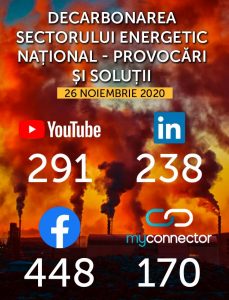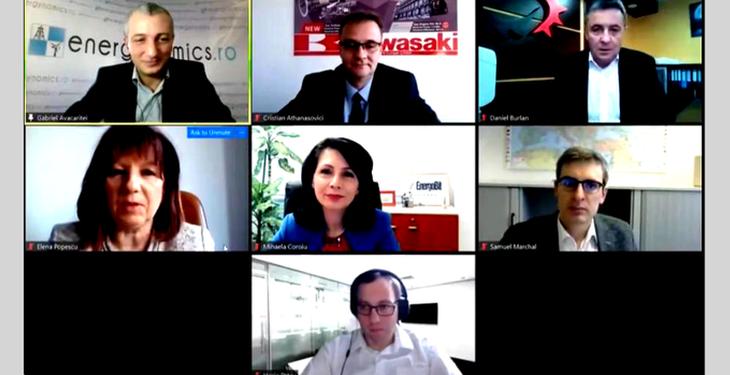The future of the Romanian economy, starting with the energy industry, depends fundamentally on the way it will meet the new environmental requirements and the objectives we have set, and for which will receive important financial support from the European Union. Decarbonization, together with increased energy efficiency, is a major challenge and it has been the theme for “Decarbonization of the national energy sector – challenges and solutions”, on online conference organized by Energynomics, with the support of our partners EnergoBit, GE, Hidroelectrica, Kawasaki Gas Turbines, Siemens Energy.
“We must already prepare the action plans, and even the feasibility studies,” insisted Elena Popescu, Director of the Direction for Energy, Transition and Renewable Policy in the Ministry of Economy, Energy and Business Environment – MEEMA. Companies and institutions that have not reached this stage yet need to urgently attract qualified people to prepare such documents so that “these projects be flexible, adapted for the present time”.
Climate neutrality dominates everything
“All European policies are influenced by the European Union’s 2050 climate neutrality target,” Elena Popescu said, and “achieving this goal depends heavily on technological developments and on the speed we will implement the available solutions.” For this it is imperative that “authorities – especially local authorities, when speaking about heating – convince to join them specialists who will identify the vision for local development and come up with credible, mature, well-executed projects”.
“We are living in an era of new technologies, where a major transformation of all sectors of the economy is happening, and only on the basis of additional expertise we will be able to adapt to this situation.
Cristian Athanasovici, Business Development Manager, Kawasaki gas Turbines Europe GmbH, warned that the central administration suffers already from a shortage of qualified staff. “What do we do with the programs that already exist, for example for investments in high-efficiency cogeneration, such as those under the POIM axis 6.4, where the projects submitted for analysis are not yet finalized? I know projects that have been waiting somewhere in the Ministry of European Funds for months and they are not completed – one explanation seems to be the lack of qualified experts within the ministry,” Cristian Athanasovici reported.
Well-qualified experts are needed
Horia Petcu, Applications Engineer at GE, noticed that Romania is caught in a vicious circle where feasibility studies are carried out by consulting companies according to the requirements imposed by the contractor, based on poorly designed specifications. In addition, “good consultants are expensive, as they work on fees aligned to the European fees” and the lowest price principle is of no help in this respect”.
The labor market is a global market, and specialists can be identified both in Romania and abroad; everything depends on the difference in the potential to attract the workforce or, on the contrary, to lose it, Horia Petcu insisted.
“If we are forced to work with the cheapest consultants, we will not have the best feasibility studies or the best investment projects,” Elena Popescu admitted. This leads to a situation where projects often do not include the most advanced and efficient technologies, solutions or business approaches.
CE Oltenia: We have prepared feasibility studies and technical sheets
CE Oltenia prepares investments of 1,4 billion euros, for which it has carried out feasibility studies and technical sheets. The documents were sent to the government to include them among the projects to be financed (50% of the value) by the Modernization Fund. “All our investments are included in National Energy and Climate Plan – NECP and in the project of the national energy strategy”, stated Daniel Burlan, general manager of the complex. “We take into consideration that as we close down mining capacities and power plants we become the beneficiaries of land that can be greened and turned into photovoltaic parks.”
“After we have the Commission’s decision and the necessary funds approved in the state budget, in the second half of 2021 we will start accessing money to start our projects,” said Daniel Burlan. “We have completed the specifications for the consultant who will assist us throughout the implementation period of the restructuring plan,” he added.
State-of-the-art technologies from GE…
GE has been present for many years in Romania, with good references and ongoing projects, and it has good understanding of the country characteristics. Ready to support the state and companies to move into the decarbonization of the power generation and utilities sectors, GE sees natural gas as the transition fuel, when used in state-of-the-art technologies.
Samuel Marchal, Senior Sales Manager GE Power, Gas Power Systems, a question frequently addressed these days – “Do we still need fossil fuel?”. Based on 2019 estimations, the electricity demand will grow significantly in the next decades. “The current electricity generation is about 27 thousands terawatt hour per year (TWh/y); if we consider a scenario with a demand increase of 1.7 percent per year until 2040, we reach about 38-39 thousands TWh/year. If we consider that the production from renewable will double from the situation today, solar and wind will heavily support the decarbonization and the growth of demand. However, we still see a gap of approximatively 17%, 6.700 thousands terawatt hour a year, which need to be filled in by fossil fuel, most probably, and by gas, especially”, he said.
… from Kawasaki
Kawasaki’s high-efficiency cogeneration technology solutions meet the request for electricity and steam/hot water in industries such as pulp and paper, medicines/cosmetics, refining and chemistry, auto, foods and beverages and district heating, Cristian Athanasovici explained. “This September, Kawasaki announced the completion for Kashima South Joint Power Corporation (Kamisu City, Ibaraki Prefecture) of 107 MW CCPP. The plant include a cogeneration facility supplying electricity and steam according to demand from surrounding factories. “The plant includes a cogeneration units that provides electricity and steam depending on the demand of the surrounding plants”, Athanasovici said.
DOWNLOAD THE PRESENTATION OF CRISTIAN ATHANASOVICI
He also outlined the Kawasaki concern’s plan to implement hydrogen-powered energy solutions, including “the first attempt in the world to supply electric power and heat generated from hydrogen gas turbine to an actual urban area”. “We have a turbine that operates in Kobe, strictly on hydrogen, while it can also operate with based on a natural gas-hydrogen mix,” Athanasovici said.
… and from Siemens
For his part, Petru Rușeț, Managing Director Siemens Energy Romania, presented the Siemens group’s vision of the energy transition. “We believe that for the 2025 horizon, it is realistic to expect a 25% reduction in global carbon emissions, 55%, in 2040, and 85%, after 2050,” said Petru Rușeț. “For reaching a level of 100%, we depend on the degree of integration of energy systems – a subject matter where Europe, and not just Romania, has a lot of work ahead.”
“Today, a real hydrogen market does not exist, neither in Europe, nor globally. There are many technologies to support the development of this market and they will start to be implemented as the demand and uptake of hydrogen at the consumer level increases”, stated the managing director of Siemens Energy Romania.
DOWNLOAD THE PRESENTATION OF PETRU RUȘET
Job creation and attraction of EU funding will be encouraged on the basis of hybrid approaches encompassing photovoltaic, hydrogen and combined cycle natural gas cogeneration solutions. “There are already such projects ongoing where Siemens is a party”, specified Petru Rușeț; he then outlined the possible path to allow the transition from coal to natural gas and for integration of renewable energy.
EnergoBit: The integrators are ready
Romania has the resources to reach its ambitions for decarbonization, according to Mihaela Coroiu, Marketing Strategy Director at EnergoBit. “There is capability at national level to clarify and implement the appropriate actions, and there is a strong local expertise to execute sustainable energy projects,” she said. “We, at EnergoBit, have access to advanced technologies and we are already connected with the latest technology manufacturers and suppliers to understand the benefits and implications of their introduction into the national energy system”, said Mihaela Coroiu.
EnergoBit focuses on the assimilation and preparation of green hydrogen solutions, which will be required as an additional input for natural gas supplying large thermal power plants. There are other focal point for EnergoBit, too, such as storage solutions and solutions to increase the flexibility of the national energy system, as well as demand response actions, whereby consumers and prosumers can be involved in increasing the flexibility of the system.
 “Decarbonization of the national energy sector – challenges and solutions”, on online conference organized by Energynomics, with the support of our partners EnergoBit, GE, Hidroelectrica, Kawasaki Gas Turbines, Siemens Energy.
“Decarbonization of the national energy sector – challenges and solutions”, on online conference organized by Energynomics, with the support of our partners EnergoBit, GE, Hidroelectrica, Kawasaki Gas Turbines, Siemens Energy.
The event “Decarbonization of the national energy sector – challenges and solutions” was organized by Energynomics, with the support of our partners EnergoBit, GE, Hidroelectrica, Kawasaki Gas Turbines, Siemens Energy. Over 1,000 people watched the conference online.
More than 170 people have registered on the MyConnector platform to participate in the dialogue, representatives of organizations such as ABB, ACUE, AGIR, ALRO, Embassy of Bulgaria, Embassy of Romania in Copenhagen, Aplind SRL, Axpo Energy Romania, BCR, BEPCO, BNP Paribas, Bursa Romana de Mărfuri, Business France, Celco SA, Celestica, CIECH Soda Romania SA, CFR SACOGEN Europe, COLTERM Timisoara, Complexul Energetic Hunedoara, Complexul Energetic Oltenia, CRH Ciment România, Electrica Furnizare SA, Electrocentrale Bucuresti SA, Elsaco, Enel X Romania, Eneria Romania, ENGIE Romania, Eximprod Grup, Honeywell, Linde, Metaplast, Metarom Industries, Mitsubishi Corporation, OMV Petrom, Romatom, STEAG Energie Romania, Voith Hydro, World Energy Council – Romanian National Committee.
